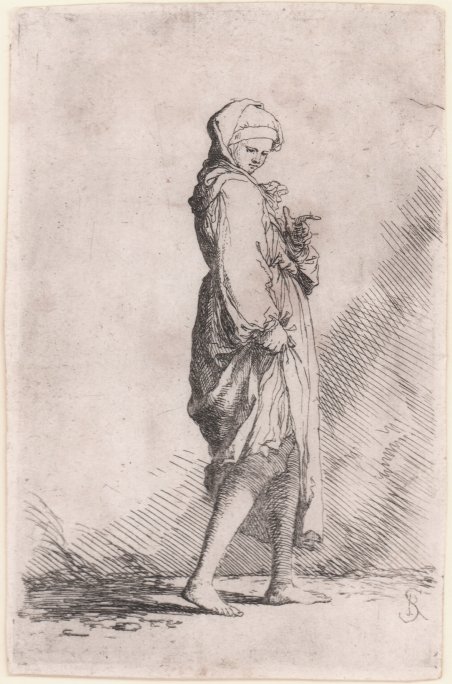Detalles
Descripción
Acquaforte e puntasecca, 1656/8 circa, monogrammata in lastra. Della serie conosciuta come ' Diverse Figure. Bellissima prova, ricche di toni, impressa su carta vergata coeva, con sottili margini, in eccellente stato di conservazione. Esemplare in secondo stato, tutte con il monogramma; le prove di primo stato, ove esistano, sono senza monogramma e note in un solo esemplare. Conosciuta con il nome di ' Diverse Figure ' o ' Figurine, rappresentano senza dubbio l’opera grafica più famosa di Salvator Rosa. Già in epoca era considerata un modello per i giovani artisti, e venne più volte copiata sia in Italia che all’estero. Nelle figure dei soldati in costumi esotici oppure d’invenzione il Rosa svolge un tema trattato da molti incisori quali Callot, Della Bella e Filippo Liagno, con il quale aveva un rapporto stretto, e tramite il quale probabilmente arrivò a conoscere i soggetti dei lanzichenecchi del XV secolo di Dürer e Urs Graf. ' Una lettera dell’artista all’amico Ricciardi datata 1656 permette di datare la serie con sicurezza la periodo 1656/8. Bartsch elenca l’opera composta da 61 stampe, mentre Rotili e Wallace descrivano alcune rare variante dei soggetti, poi mai inserite nella serie, portando il numero delle Figurine a 72. Etching and drypoint, circa 1656/8, monogrammed in plate. From the series known as ' Diverse Figure. Beautiful proof, rich in tone, impressed on contemporary laid paper, with thin margins, in excellent condition. Example of the second state, sjowing the Rosa’s monogram; first-state proofs, where they exist, are unmonogrammed and known in only one copy. Known as ' Diverse Figure ' or ' Figurine, they are without doubt the most famous graphic work of Salvator Rosa. Already at that time it was considered a model for young artists, and was copied several times both in Italy and abroad. In the figures of soldiers in exotic or invented costumes, Rosa develops a theme treated by many engravers such as Callot, Della Bella and Filippo Liagno, with whom he had a close relationship, and through whom he probably came to know the subjects of the fifteenth-century Lansquenets by Dürer and Urs Graf. A letter from the artist to his friend Ricciardi dated 1656 allows the series to be dated with certainty to the period 1656/8. Bartsch lists the work as consisting of 61 prints, while Rotili and Wallace describe some rare variants of the subjects, later never included in the series, bringing the number of Figurine to 72. Cfr.

Descubre cómo utilizar
Descubre cómo utilizar

